Nation & World
-

Unfuzzy math: U.S. needs to do better
Ed School expert has some ideas, including a rethink of homework bans, after ‘discouraging’ results

-

What to expect when you’re elected
Bipartisan group of lawmakers gets to know Washington by way of the IOP
-

Defining and confronting campus antisemitism
Scholars in Jewish Studies say education, conversation can bolster efforts to defeat hate
-
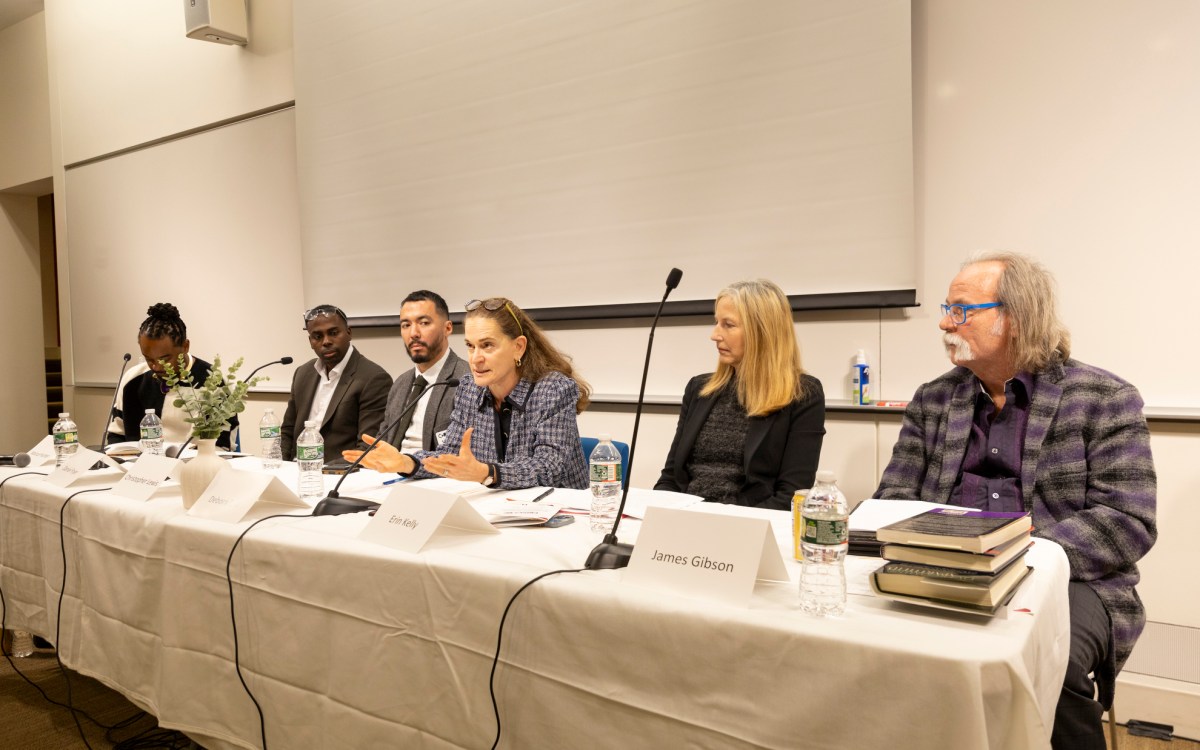
Are reparations the answer?
Harvard symposium explores case for restitution to Black Americans legally, economically, ethically
-

Exact cause of Notre-Dame fire still unclear. But disaster perhaps could’ve been avoided.
Leadership expert says foreseeable factors all contributed to complex failure. Consistent focus needed on best practices, rules, procedures.

-
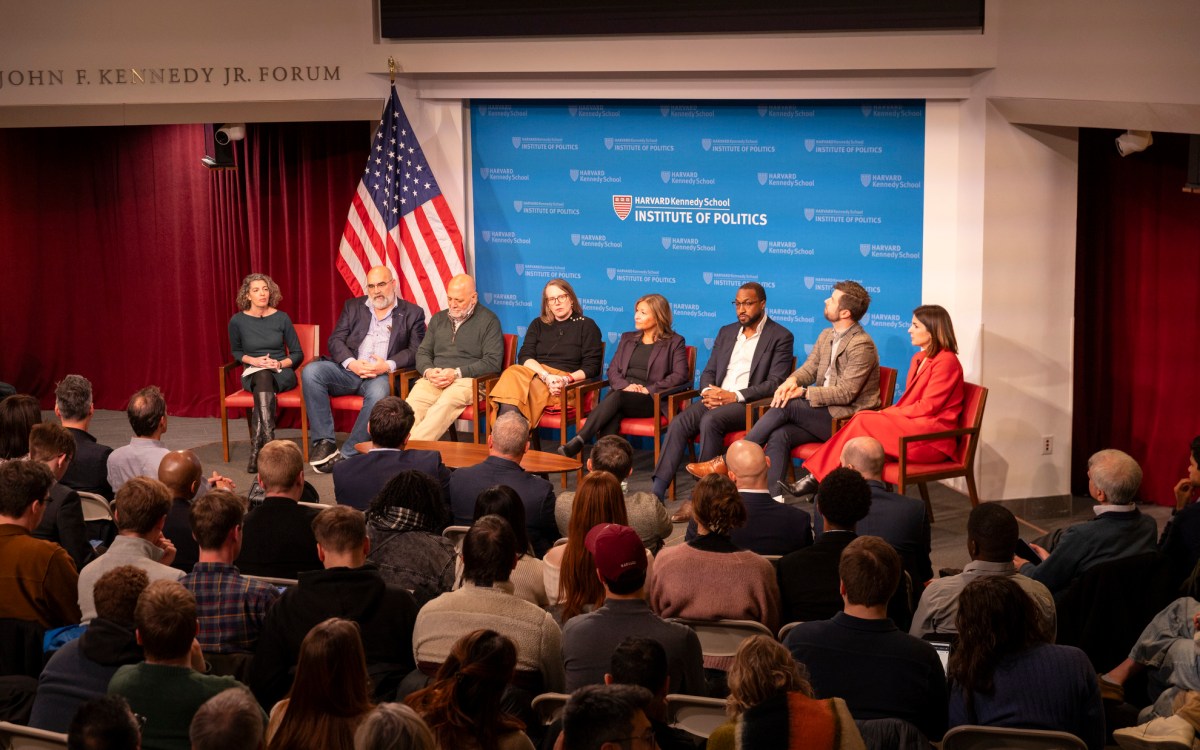
How the presidency was won, lost
Top campaign leaders from both sides talk about what worked, didn’t at Kennedy School postmortem
-
Carr Center awards Traub-Dicker Fellowships for summer 2009
The Carr Center for Human Rights Policy at the Harvard Kennedy School (HKS) has awarded Traub-Dicker-HKS Fellowships for the summer of 2009 to Benjamin Hall and Baylee DeCastro. Hall and DeCastro will spend the summer researching in the domain of policies affecting the lesbian, gay, bisexual, and transgender (LGBT) communities.
-
Shorenstein Center announces Rosenthal Writer-in-Residence Program
The Shorenstein Center on the Press, Politics and Public Policy has created a new program for writers, named in honor of A.M. Rosenthal.
-
Finding the founding ideas
In 1788, Thomas Shippen of Philadelphia, a citizen of the world’s newest nation, visited the French royal court at Versailles. He was awed by its pomp, its riches, and – as he wrote – its “Oriental splendor.” But Shippen was also repulsed. He remarked on the arrogance and waste of royal life, and on the fact that it required great suffering among France’s unrepresented poor.
-
Housing woes continue, says Harvard report
The worst U.S. housing downturn in generations continues to grind on, finds a study released today (June 22) by the Joint Center for Housing Studies of Harvard University.
-
Working to lift the fog of war
Thousands of miles from his Harvard lab, Kevin Kit Parker is lugging a gun and his engineer’s sensibilities through the mountains south of Kabul, in Afghanistan’s Wardak and Logar Provinces.

-
BBC Radio’s prestigious Reith Lectures delivered by Sandel
Harvard Professor Michael Sandel, chosen by the BBC to deliver its Reith Lectures for 2009, can be heard on the BBC Web site.
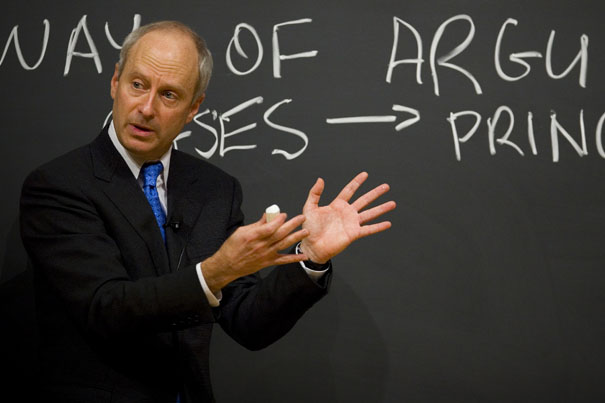
-
Some HBS students adopt ethical code
Approximately half of the 886 graduating HBS students took the professors’ comments seriously enough to sign a managerial version of the Hippocratic oath.
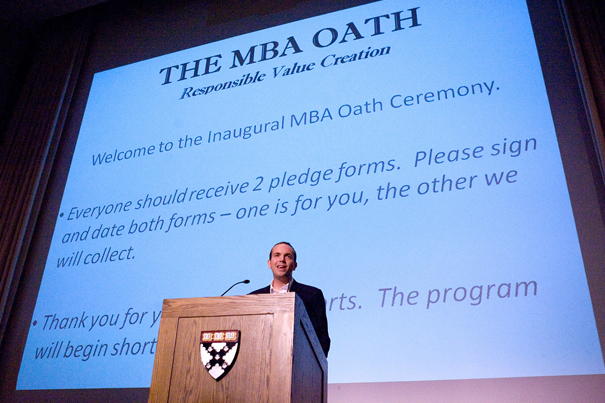
-
Kip Kitur ’09 plans to head home to help
While growing up in the Rift Valley Province in western Kenya, Kipyegon A. “Kip” Kitur milked goats and fed cattle before running to school. It was two miles away, uphill, past steep maize farms.
-
Talking terror
The two men sit close, knees almost touching, in a mud-walled hut in the Congolese village of Katokota.
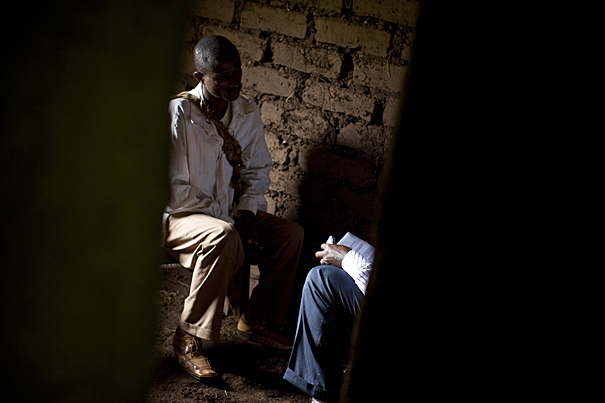
-
Still ‘two cultures’ but who’s on top?
Fifty years ago a simple lecture sparked a global debate with lasting implications. On May 7, 1959, British physicist and novelist C.P. Snow declared that the gap between “two cultures,” that of the sciences and the humanities, was a destructive divide hampering the effort to find solutions to the problems of the world.
-
HBS teams share dreams for success
In a series of presentations in Burden Auditorium, teams of students recently presented their ideas and dreams for entrepreneurial success at the final round of Harvard Business School’s (HBS) 13th annual Business Plan Contest.
-
Religion key to foreign policy, says HKS speaker
As President Obama and his new administration seek to redirect U.S. foreign policy back toward more emphasis on diplomacy and less on the use of force, they should not overlook Orthodox Christianity as a resource.
-
Sandel to Deliver BBC’s prestigious Reith Lectures
Michael Sandel, the Anne T. and Robert M. Bass Professor of Government, has been chosen by the BBC to deliver its Reith Lectures for 2009. Sandel’s lectures, titled “A New Citizenship,” will address the prospect for a new politics of the common good.
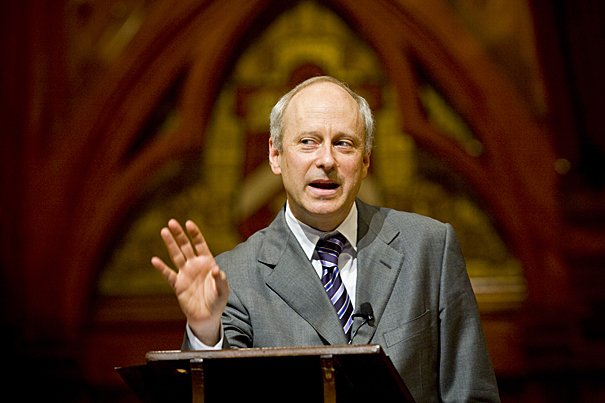
-
Art for sale!
Harvard gave Christie’s and Sotheby’s a run for their money at the first Harvard Student Art Show on Monday (May 4). The exhibit and sale, held in a bright yellow tent on the Science Center Lawn, featured 160 works of painting, sculpture, photography, and other media such as jewelry and clothing. Students from across the University submitted artwork ranging in price from $30 to $8,000.
-
Nieman presents Louis M. Lyons Award to Fatima Tlisova
The Nieman Foundation for Journalism at Harvard will present the Louis M. Lyons Award for Conscience and Integrity in Journalism to current Nieman Fellow Fatima Tlisova Thursday (May 7).
-
‘Paging God: Religion in the Halls of Medicine’
What happens when a Buddhist monk visiting the United States is hospitalized, terminally ill with liver cancer? Does religion interfere with his medical care? What about his Buddhist brethren, unable to join him bedside? Who will provide the appropriate services and ceremonies? Well, says Wendy Cadge, that’s where hospital chaplains come in.
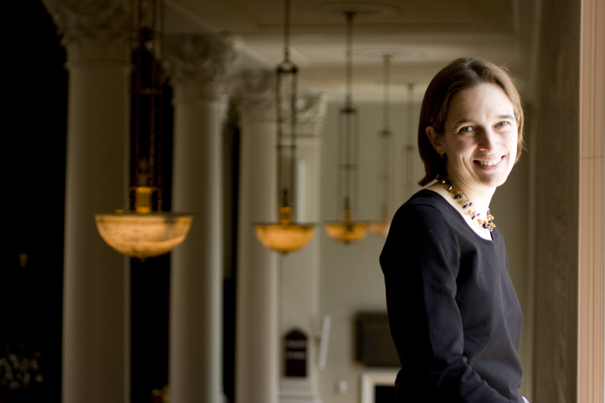
-
‘Enormous changes’ in thirty years
In Chinese culture, the 60th birthday is an auspicious event. At that age, it is said that a person is at ease.
-
Geneticist ‘who doesn’t believe in God’ offers new conception of divine
The Paul Tillich Lecture, offered annually at Harvard since 1990, commemorates the memory of a public intellectual who was once “the largest theological figure in our orbit,” said The Rev. Peter J. Gomes.
-
Obama and the art of the possible
With the passing of Barack Obama’s 100th day in office, journalists and pundits are posing a simple but all-important question: How is the president doing? Robert Kuttner, author and political commentator, gave his own evaluation of the Obama presidency for the 2009 Lowell Lecture on April 30 in Emerson Hall.
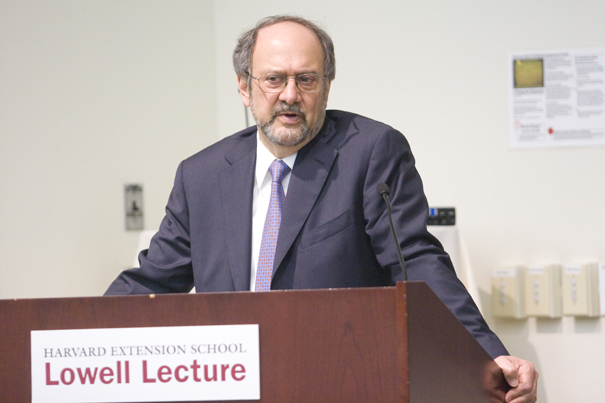
-
Oldest living Holocaust survivor speaks at Harvard
Aided by a wheel chair, his slight frame bent in part by a curvature of the spine since birth, in part by the passage of time, a man who endured unspeakable cruelty 70 years ago told his story of survival to a Harvard audience.
-
Looking horror in the face
Imani was just 15 when soldiers from the rebel group Interahamwe found her on the road in a remote region in the eastern Democratic Republic of the Congo (DRC).
-
Simulating chaos to teach order
A troubled piece of Africa came to North Andover, Mass., last weekend (April 24-26) as more than 50 students from a collaborative, three-university humanitarian program took part in a hands-on outdoor field course that simulated an emergency on the border between Chad and Sudan’s troubled Darfur region.
-
The Dalai Lama speaks at Harvard
The Dalai Lama addressed a capacity crowd at the Memorial Church on Thursday (April 30). With his trademark affable, down-to-earth style the religious leader counseled the audience about the important things in life in a talk titled “Educating the Heart.”
-
Economic recovery
ECONOMIC RECOVERY: David S. Scharfstein, Edmund Cogswell Converse Professor of Finance and Banking, Harvard Business School
-
Nuclear terrorism
NUCLEAR TERRORISM: Graham Allison, Douglas Dillon Professor of Government, Harvard Kennedy School, director of Belfer Center for Science and International Affairs
-
Human rights
HUMAN RIGHTS: Jennifer Leaning, professor of the practice of global health, Department of Global Health and Population, Harvard School of Public Health, co-director, Harvard Humanitarian Initiative, associate professor of medicine, Harvard Medical School, director, Inter-University Initiative on Humanitarian Studies and Field Practice
-
The environment
THE ENVIRONMENT: William Clark, Harvey Brooks Professor of International Science, Public Policy and Human Development, Harvard Kennedy School
-
Foreign policy
FOREIGN POLICY: Ernest May, Charles Warren Professor of American History, Harvard Kennedy School
-
Research funding
RESEARCH FUNDING: Douglas A. Melton, Harvard College Professor, Thomas Dudley Cabot Professor of the Natural Sciences, investigator at the Howard Hughes Medical Institute, co-director of the Harvard Stem Cell Institute
-
Public service
PUBLIC SERVICE: Evelynn Hammonds, dean of Harvard College, Barbara Gutmann Rosenkrantz Professor of the History of Science and of African and African American Studies

